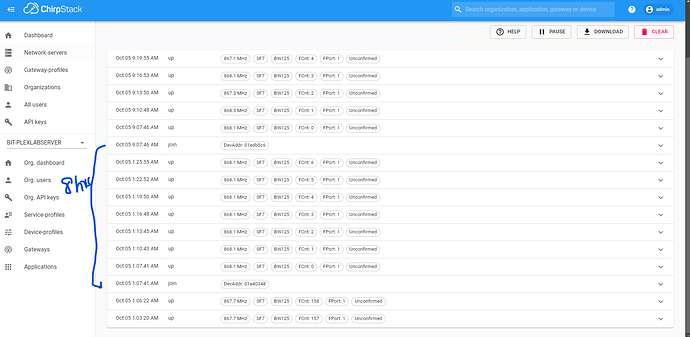Hello guys,
I need help with this because I am trying for a month now to fix this. I have a node device and I have done all the configuration according to the github documentation of MCCI
my platformio.ini file is as follows
; PlatformIO Project Configuration File
;
; Build options: build flags, source filter
; Upload options: custom upload port, speed and extra flags
; Library options: dependencies, extra library storages
; Advanced options: extra scripting
;
; Please visit documentation for the other options and examples
; https://docs.platformio.org/page/projectconf.html
[env:genericSTM32F103C8]
platform = ststm32
board = genericSTM32F103C8
framework = arduino
debug_tool = stlink
board_build.core = stm32
lib_deps =
adafruit/Adafruit ADS1X15@^2.5.0
bblanchon/ArduinoJson@^7.2.0
; matthijskooijman/IBM LMIC framework@^1.5.1
mcci-catena/MCCI LoRaWAN LMIC library@^4.1.1
build_flags =
-D ARDUINO_LMIC_PROJECT_CONFIG_H_SUPPRESS
-D CFG_eu868=1
-D CFG_sx1276_radio=1
-D LMIC_LORAWAN_SPEC_VERSION=LMIC_LORAWAN_SPEC_VERSION_1_0_2
The devices functions properly just the Lorawan side of things doesnt seem right, here is an image from chirpstack server.
a screenshot from the serial port the join at 9:07 pm is here:
-157610058: EV_TXSTART
-157288904: EV_JOINED
netid: 0
devaddr: -------- (just to hide it)
AppSKey: --------------------------------------------------- (just to hide it)
NwkSKey: --------------------------------------------------- (just to hide it)
-157288075: EV_TXSTART
-157141837: EV_TXCOMPLETE (includes waiting for RX windows)
I don’t understand why the time gets overflown? its a signed integer in the library, can someone guide why used a signed integer for time keeping? I saw a comment in the source that the negative means the time has already passed. Its confusing so please if someone can guide I will be really thankful.
I have placed an 8 hours reset of the lorawan stack so it does this every 8 hours just to avoid a complete stop:
void lmicStart (void) {
// LMIC init
os_init();
// Reset the MAC state. Session and pending data transfers will be discarded.
LMIC_reset();
// Set up the channels used by the Things Network, which corresponds
// to the defaults of most gateways. Without this, only three base
// channels from the LoRaWAN specification are used, which certainly
// works, so it is good for debugging, but can overload those
// frequencies, so be sure to configure the full frequency range of
// your network here (unless your network autoconfigures them).
// Setting up channels should happen after LMIC_setSession, as that
// configures the minimal channel set.
// NA-US channels 0-71 are configured automatically
LMIC_setupChannel(0, 868100000, DR_RANGE_MAP(DR_SF12, DR_SF7), BAND_CENTI); // g-band
LMIC_setupChannel(1, 868300000, DR_RANGE_MAP(DR_SF12, DR_SF7B), BAND_CENTI); // g-band
LMIC_setupChannel(2, 868500000, DR_RANGE_MAP(DR_SF12, DR_SF7), BAND_CENTI); // g-band
LMIC_setupChannel(3, 867100000, DR_RANGE_MAP(DR_SF12, DR_SF7), BAND_CENTI); // g-band
LMIC_setupChannel(4, 867300000, DR_RANGE_MAP(DR_SF12, DR_SF7), BAND_CENTI); // g-band
LMIC_setupChannel(5, 867500000, DR_RANGE_MAP(DR_SF12, DR_SF7), BAND_CENTI); // g-band
LMIC_setupChannel(6, 867700000, DR_RANGE_MAP(DR_SF12, DR_SF7), BAND_CENTI); // g-band
LMIC_setupChannel(7, 867900000, DR_RANGE_MAP(DR_SF12, DR_SF7), BAND_CENTI); // g-band
LMIC_setupChannel(8, 868800000, DR_RANGE_MAP(DR_FSK, DR_FSK), BAND_MILLI); // g2-band
// TTN defines an additional channel at 869.525Mhz using SF9 for class B
// devices' ping slots. LMIC does not have an easy way to define set this
// frequency and support for class B is spotty and untested, so this
// frequency is not configured here.
// Disable link check validation
LMIC_setLinkCheckMode(0);
// // TTN uses SF9 for its RX2 window.
// LMIC.dn2Dr = DR_SF9;
// Set data rate and transmit power for uplink (note: txpow seems to be ignored by the library)
LMIC_setDrTxpow(DR_SF10,14);
LMIC_setClockError(MAX_CLOCK_ERROR * 10 /100);
// Start job (sending automatically starts OTAA too)
do_send(&mySendjob);
}
Without the 10% clock error set the join procedure takes 10-15 minutes.
Thank you guys, and if anyother information is required then please let me know.
